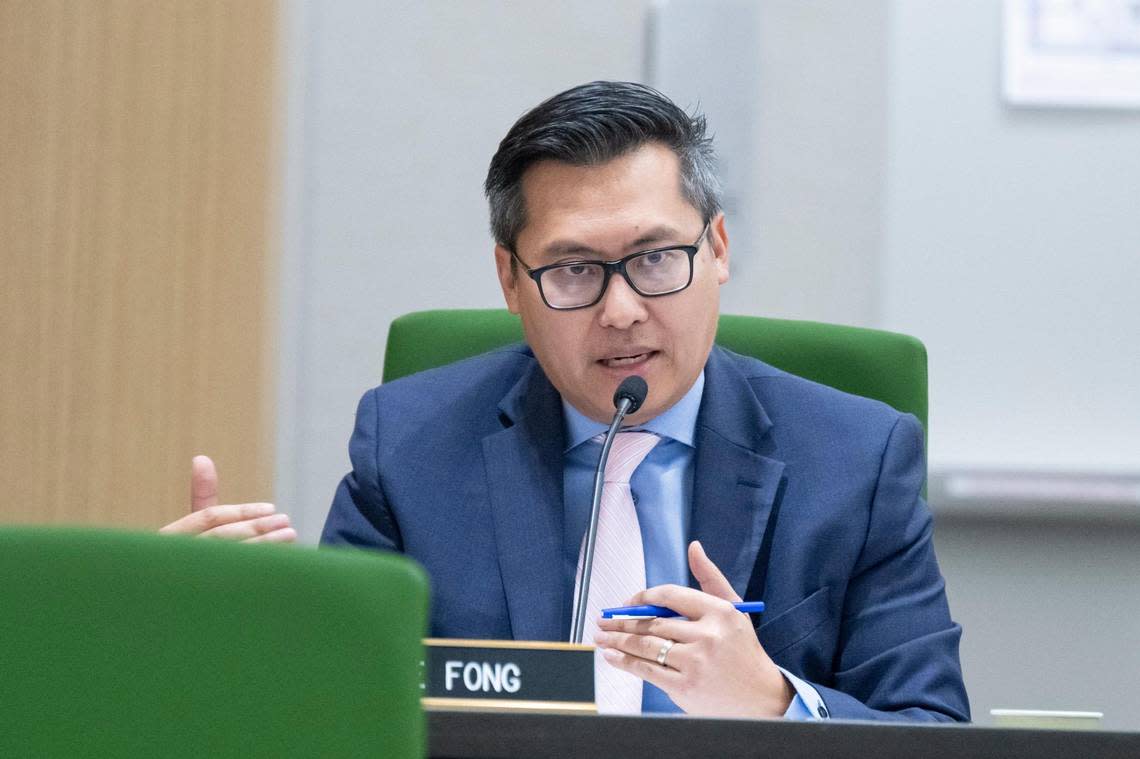A bill to stop California lobbyists from secretly negotiating deals could die Thursday | Opinion

- Oops!Something went wrong.Please try again later.
A bill that would ban lobbyists from using non-disclosure agreements to secretly negotiate legislation is stirring up good trouble at the Capitol this week. Too bad it’s likely to die in committee on Thursday, crushed by the suffocating weight of heavily monied business interests.
Assemblyman Vince Fong, R-Bakersfield, introduced Assembly Bill 2654 after Gov. Gavin Newsom’s “Panera-gate” debacle last month. In case you missed it, secret negotiations gifted some businesses that produce bread, like Panera, with an exemption from having to pay fast workers $20 an hour. As reported by Ashley Zavala at KCRA, the groups involved in those negotiations signed non-disclosure agreements — NDAs — that prevented the public from ever finding out who asked for the exemption, and why or how the exemption came to exist.
Opinion
That exemption seemed to benefit Gregg Flynn, a franchise owner of multiple Panera locations across the state — and a billionaire Newsom donor.
That’s not OK. The highest goal of good government should be full transparency to the people it represents.
So along came AB 2654, a bill so simple, that even a billionaire could understand it: “The following individuals shall not enter into, or request that another party enter into, a nondisclosure agreement relating to the drafting, negotiation, discussion or creation of legislation: A lobbyist, … a public official, a member or employee of the Legislature (or) an employee of the office of the governor.” The bill also stipulates that any non-disclosure agreement entered into after the adoption of the bill is null and void.”
And that’s it. This bill merely seeks to stop the kind of behavior that kept the Panera-gate negotiations a secret from the public.
Perhaps that’s why the California Chamber of Commerce is working so hard to kill it.
In its first letter of opposition, CalChamber wrote that it “strongly opposed” the bill and accused Fong of “posturing.” In an update released Tuesday, the powerful business group tones down its language, but took umbrage with the bill “unfairly and arbitrarily” targeting lobbyists — which isn’t true, as anyone can see from reading the bill’s language.
“CalChamber literally opposed a bill (...) because they only had 4 days to view a gut and amend,” wrote Republican Assemblyman Joe Patterson in a post on X (formerly known as Twitter). “I hold their concerns in high regard, but no one, including them, actually believes the process is transparent.”
Meanwhile, other statewide business interests, including the California Business Roundtable, the California Business Properties Association and the National Federation of Independent Business, came out in strong support of the bill on Tuesday.
“(I)n order to do our due diligence, we reached out to four previous gubernatorial administrations to determine if NDAs were ever used or even considered,” wrote the business organizations in a joint letter of support. “The answer was a resounding ‘no.’ There has been no change in law that would now require NDAs, no strengthening of (the California Public Records Act) or (the Legislative Open Records Act) that would necessitate such mandated secrecy.”
The California Public Records Act of 1974 exists for a reason: to provide transparency in the legislative process. A non-disclosure agreement shouldn’t even be a matter of discussion for legislators or lobbyists, said attorney, lobbyist and adjunct professor at McGeorge School of Law, Chris Micheli.
“I haven’t heard before, from either legislators or lobbyists who have been here longer than I have, that they’ve ever utilized a non-disclosure agreement in their negotiations,” Michaeli said. “I’m curious why they would be necessary. (This bill would) expand transparency and limit the role of lobbyists in the legislative process.”
Such actions violate the spirit of the Bagley-Keene Act, which was passed in 1967 to strengthen the Brown Act and open up more government proceedings to public oversight. It declared that “the people of this state do not yield their sovereignty to the agencies which serve them.”
“The people, in delegating authority, do not give their public servants the right to decide what is good for the people to know and what is not good for them to know. The people insist on remaining informed so that they may retain control over the instruments they have created.”
The governor, some lobbyists and certain powerful business interests may wish for this bill and the problem it represents for them to silently slip away, but their opposition speaks loudly — louder than any language an NDA could quiet.
AB 2654 is an update to the state’s Political Reform Act of 1974, and so requires a two-thirds vote from the Legislature, but only in floor votes, not in committees such as the Elections Committee, where it currently sits awaiting a simple majority decision on Thursday.
Will the committee members — Gail Pellerin, D-Santa Cruz; Tom Lackey, R-Palmdale; Steve Bennett, D-Ventura; Marc Berman, D-Menlo Park; Sabrina Cervantes, D-Riverside; Bill Essayli, R-Corona; Evan Low, D-Campbell; and Akilah Weber, D-San Diego — let themselves be swayed by such obviously biased opposition, from lobbyists working in bad faith?
They say money talks, but I think the people of California deserve to hear what it’s saying.

